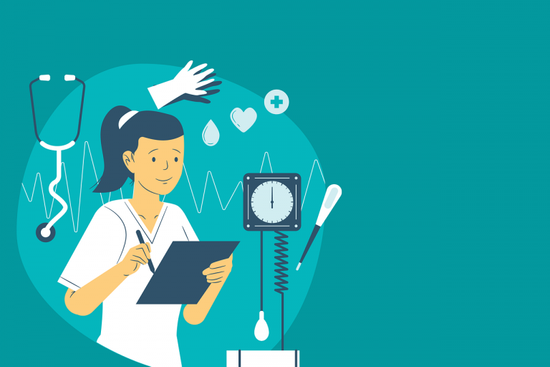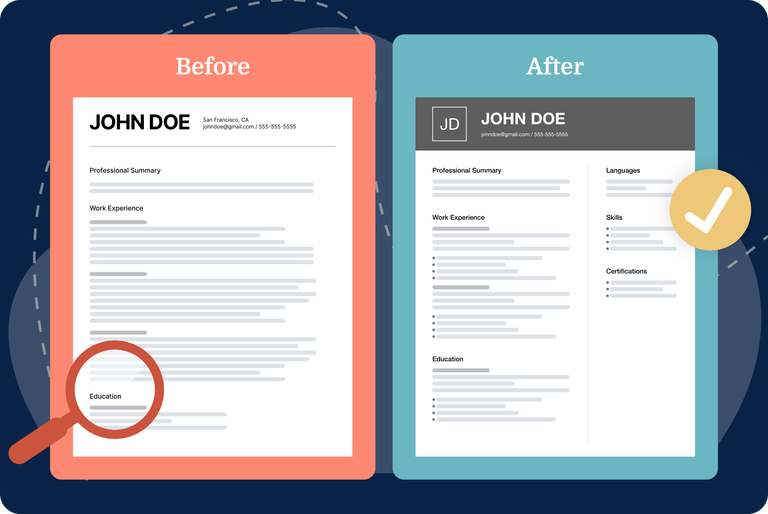Nursing Skills: Examples & Tips for Your Resume

Our customers have been hired at: *Foot Note
AI Resume Skills Generator

Nursing work is the cornerstone of health care, encompassing many responsibilities vital to patient care and recovery. Nurses are the frontline providers who ensure the well-being of patients through direct care, patient education and emotional support. They perform critical tasks such as administering medications, monitoring vital signs, conducting physical assessments and coordinating with other health care professionals to develop and implement comprehensive care plans.
Approximately 193,100 openings for registered nurses are projected each year, on average, over the next 10 years. You’ll need the right nursing skills and an impressive resume to beat the competition and land your dream job. Read our comprehensive guide on how to write a resume for tips.
What are nursing skills?
Nursing skills include a range of abilities and knowledge crucial for providing high-quality patient care. To succeed, nurses use hard, soft, computer, technical and transferable skills. Mastering and showcasing these skills on your resume effectively can help you stand out in this competitive field.
Use this template of a resume with sales skills to start your own, or explore our library of resume templates for more styles.
Examples of nursing skills
Hard skills
Hard skills are specific, teachable abilities that can be defined and measured. These are typically acquired through education, training and hands-on experience in nursing.
Examples of hard nursing skills include:
- Administering medication
- Performing wound care
- Conducting physical assessments
- IV line insertion and management
- Operating medical equipment
See also:
Soft skills
Soft skills are personal attributes that enable someone to interact effectively and harmoniously with others. These are crucial in nursing for ensuring a positive patient experience and effective teamwork.
Examples of soft nursing skills include:
- Communication
- Empathy
- Critical thinking
- Time management
- Teamwork
See also: Critical Thinking Skills: Examples for Your Resume
Computer skills
Computer skills are essential for modern nurses, as they need to use various digital tools and electronic health record (EHR) systems to manage patient information and care.
Examples of computer skills for nurses include:
- Proficiency with EHR systems
- Data entry and management
- Telemedicine tools
- Basic IT troubleshooting
- Using healthcare software (e.g., Meditech, Epic)
Technical skills
Technical skills are specific knowledge and expertise needed to perform clinical tasks and operate medical technology effectively.
Technical skills for nurses include:
- Understanding medical procedures
- Equipment sterilization
- Monitoring vital signs
- Using diagnostic machines (e.g., ECG, MRI)
- Performing CPR and first aid
Physical skills
Physical skills are essential for nurses to carry out clinical procedures, ensure patient safety and provide comfort.
Some physical skills for nurses include:
- Administering injections
- Drawing blood
- Performing CPR
- Inserting IV lines
- Conducting physical examinations
- Lifting and moving patients
- Dressing wounds
- Taking vital signs
- Assisting in surgeries
- Operating medical equipment
Interpersonal skills
Interpersonal skills are crucial for nurses as they are pivotal in patient interactions and collaborative health care environments.
Some interpersonal nursing skills include:
- Communication
- Empathy
- Active listening
- Building rapport
- Conflict resolution
- Cultural competence
- Collaboration
- Patient advocacy
- Emotional intelligence
- Patient education
Transferable skills
Transferable skills are abilities and competencies useful in various jobs and industries, not just nursing. These skills can enhance your adaptability and employability in different roles within health care and beyond.
Examples of transferable nursing skills include:
- Leadership
- Problem-solving
- Organizational skills
- Conflict resolution
- Multitasking
See also:
How to improve your nursing skills
Improving your nursing skills is critical to mastering them and standing out from others in this competitive field.
Here are some tips for developing your nursing skills:
Pursue additional certifications or specializations. Obtain industry-recognized certifications in specialized nursing, such as pediatric nursing, oncology, radiology or critical care.
Attend workshops and professional development courses. Workshops and courses provide hands-on training on various nursing topics, helping you expand your expertise, stay current on current research and trends in the field, increase your skill set and build your confidence.
Participate in simulation training sessions. Professional simulation experiences provide safe, controlled environments to practice and refine your clinical skills.
Seek mentorship and guidance from experienced nurses. Mentors provide guidance, support and knowledge based on experience. Novice nurses can learn best practices and clinical techniques from their more seasoned counterparts.
How to highlight nursing skills on your resume
Nursing skills demonstrate your ability to provide high-quality patient care, perform clinical tasks proficiently, and interact effectively with patients and health care teams. By highlighting these skills on your resume, you showcase your competence, dedication and versatility, which are highly valued qualities in the health care industry. Check out our registered nurse resume examples and templates to get started.
Review our tips below to help you describe your nursing skills throughout your resume.
Highlight nursing skills in your resume summary or objective.
Adding your nursing skills to your resume summary can immediately capture potential employers’ attention.
Here’s an example of a good resume summary emphasizing nursing skills:
We recommend using a resume objective if you are new to nursing because it focuses on your career goals and transferable nursing skills.
A good resume objective for a new nurse looks like this:
Emphasize your skills in a separate section
Create a separate section for your skills and make them more effective by creating categories such as “Clinical Skills,” “Interpersonal Skills,” and “Technical Skills.” Use bullet points to make them easy to read and ATS-friendly. We recommend listing up to 12 job-relevant skills.
For example:
Clinical Skills
- Patient assessment
- Wound care
- Catheter placement
Interpersonal Skills
- Compassion
- Active listening
- Patient advocacy
- Cultural competence
Technical Skills
- Electrocardiogram assessment
- Telehealth technology
- Patient monitoring systems
Display your quantifiable achievements
Showcase what you can do with your nursing skills by listing your past accomplishments instead of your work responsibilities in your work history section, or
create a separate section to display your top achievements.
Here are some examples of quantifiable achievements that demonstrate nursing skills:
- Achieved a 15% increase in patient satisfaction scores over the past year by implementing personalized care plans and enhancing communication with patients and their families.
- Successfully reduced medication administration errors by 20% through rigorous adherence to safety protocols and participation in continuous medication management training programs.
- Managed an average of 15 patient admissions and discharges per shift, streamlining processes to decrease patient wait times by 25% and improve overall hospital efficiency.
- Led an infection control initiative that resulted in a 30% reduction in hospital-acquired infections by implementing stricter hygiene protocols and staff education sessions.
- Enhanced team performance by achieving 100% compliance in mandatory staff training and certifications, ensuring all team members were current with the latest clinical practices and safety standards.
Make a resume with MyPerfectResume
Our Resume builder can help you write the perfect resume. Start Now!
Use action words to describe your nursing skills
Action words like “administer,” “implement,” and “monitor” highlight the impact of your work as a nurse. Use them to emphasize your nursing skills.
For example, stating that you “Streamlined patient discharge procedures, reducing average discharge time by 30% and improving bed turnover rates, which enhanced overall hospital efficiency and patient flow” clearly demonstrates that you are organized and efficient.
Here are some powerful action words to describe your nursing skills:
- Apply
- Assess
- Coordinate
- Diagnose
- Evaluate
- Manage
- Monitor
- Prioritize
- Serve
- Support
Common tools and technologies used in nursing
Nurses use various modern tools and technologies to enhance efficiency, accuracy and patient care. Below is a list of some common tools and technologies to master as a nurse.
- Electronic Health Record (EHR) systems help nurses store and manage patient health information securely.
- Patient monitoring systems track and display vital signs, such as blood pressure, heart rate and oxygen saturation.
- Medication administration systems dispense and document patient medications to ensure accuracy and safety.
- Telehealth platforms are technologies for remote patient monitoring, virtual consultations and telemedicine appointments.
- Diagnostic equipment includes stethoscopes, otoscopes and thermometers used for assessing patient health and diagnosing conditions.
- Electronic medication verification systems are barcode scanning systems to verify medications before they are administered, preventing and reducing errors.
- Mobile health apps access medical information, educational resources and patient data on mobile devices.
- Point-of-care testing devices are portable tools for immediate diagnostic testing, such as glucose meters and rapid strep tests.
- Smart IV pumps are infusion pumps with advanced features for delivering fluids, medications and nutrients intravenously.
- Wearable health technology includes devices patients wear to monitor activity levels, heart rate and other health metrics, providing real-time data to health care providers.
Best nursing certifications
Certifications can enhance your resume because they demonstrate specialized knowledge, commitment to ongoing education in the nursing industry, passion for your work and a proactive approach to professional development.
Here is a short list of certifications for nurses:
- Certified Nursing Assistant (CNA)
- Registered Nurse (RN) License
- Advanced Cardiac Life Support (ACLS)
- Pediatric Advanced Life Support (PALS)
Key takeaways
Here’s a run-down of the main points from this article:
- Nursing forms the foundation of health care, encompassing diverse responsibilities crucial for patient care and recovery.
- Nurses utilize many skills, including hard, soft, computer, technical and transferable skills, which are vital for success in the field.
- Nursing skills range from administering medication and conducting physical assessments to utilizing advanced medical equipment and fostering patient communication and empathy.
- Transferable skills such as leadership, problem-solving and organizational abilities are invaluable in nursing and applicable across various health care settings.
- Pursuing certifications, attending professional development courses, participating in simulation training and seeking mentorship can significantly improve nursing skills and career prospects.
FAQ
What are the most important nursing skills to highlight on a resume?
Highlight skills such as patient assessment, medication administration, wound care and effective communication. These demonstrate your ability to provide direct patient care, collaborate with health care teams, and ensure positive patient outcomes.
How should I format my nursing skills section on a resume?
Organize your skills into categories such as Clinical Skills (e.g., patient assessment, wound care), Interpersonal Skills (e.g., empathy, communication), Technical Skills (e.g., ECG interpretation, medication administration systems), and Computer Skills (e.g., EHR systems, telehealth platforms). Use bullet points for clarity and list up to 10-12 relevant skills.
How can I showcase my nursing certifications effectively on my resume?
List certifications prominently under a dedicated section, including details such as certification name, issuing organization and date obtained. Highlighting certifications like ACLS (Advanced Cardiac Life Support) or specialty certifications (e.g., Certified Pediatric Nurse) can strengthen your candidacy
How should I describe my nursing skills during a job interview?
During a job interview, use examples to illustrate how you’ve applied your nursing skills in previous roles. Discuss specific patient cases where your skills in patient assessment, critical thinking, or teamwork led to positive outcomes. Highlight your ability to handle challenging situations and contribute effectively to health care teams.
What are some tips for improving nursing skills outside of work?
Consider attending workshops, seminars, or online courses to expand your knowledge and skills outside of work. Join professional nursing associations or study groups to stay updated on current practices and advancements in health care. Additionally, seek mentorship from experienced nurses to gain insights and guidance for career development.
How we reviewed this article
Since 2012, we have helped more than 11 million job seekers. We want to make your career journey accessible and manageable through our services and Career Center’s how-to guides and tips. In our commitment to bring you a transparent process, we present our Editorial Process.
Sources
- U.S Bureau of Labor Statistics. Occupational Outlook Handbook. Registered Nurses
Our customers have been hired at:*Foot Note













